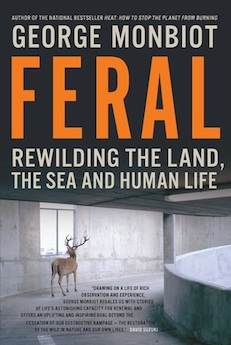By Benjamin Franklin Martin
For George Monbiot, “There was no state of grace, no golden age in which people lived in harmony with nature.” Destruction of the environment in Europe began with the Neolithic farmers, who cut down the forests, hunted the wild beasts to extinction, and introduced flocks of sheep, an “invasive species” from Mesopotamia, which by compacting the soil while stripping it of most vegetation have “done more damage. . . than either climate change or industrial pollution.” The ancient forests became heaths, open treeless hills, domesticated, like all the larger animals: “ecological boredom.”
Monbiot calls for “rewilding,” which he defines as restoring “to the greatest extent possible ecology’s dynamic interactions.” The removal of sheep and cattle from marginally productive land will permit the regrowth of forests with their high canopy of trees, thick underbrush, and return of larger animals, wolves, bears, lynx, and beavers. The predators produce “trophic cascades”: by keeping herbivores in check, they make possible the more rapid spread of vegetation and thus the creation of habitat for smaller mammals and birds. The beavers are a “keystone species”: by building dams, they slow down rivers and so create small wetlands that have the same result.
Conservationists most often want to preserve only what they knew or what recent memory recalls. They are reformers. Monbiot is a revolutionary. Instead of bending nature to civilization, he would bend civilization to nature. He admits the power of the retort that his goal is “a post-Romantic ideology.” Yet he can point to increasing swaths of Europe that have undergone rewilding by default as farming has retreated in areas of Scandinavia, Poland, the Baltic States, Russia, the Balkans, even in France and Spain. The estimate of bears in Europe is now 25,000, of wolves, 12,000, of lynx, 10,000. Indomitable, the wild returns.
Benjamin Franklin Martin (ΦΒΚ, Davidson College, 1969) is the Price Professor of History at Louisiana State University and a resident member of the Beta of Louisiana Chapter of Phi Beta Kappa.




